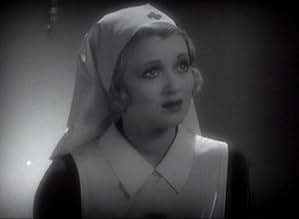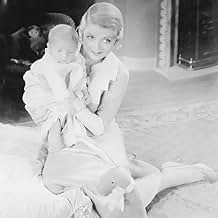A war officer who is thought dead returns to the woman he loves, only to find that she has remarried.A war officer who is thought dead returns to the woman he loves, only to find that she has remarried.A war officer who is thought dead returns to the woman he loves, only to find that she has remarried.
- Awards
- 1 win total
Daisy Belmore
- Tibbetts - Nurse
- (uncredited)
Billy Bevan
- Departing British Soldier
- (uncredited)
Edmund Breon
- Tom Kent
- (uncredited)
Eddy Chandler
- Captain Peters
- (uncredited)
Jay Eaton
- Dancing Doughboy
- (uncredited)
Bill Elliott
- Dancing Doughboy
- (uncredited)
Fred Esmelton
- Ponsonby's Butler
- (uncredited)
Mary Forbes
- The Duchess
- (uncredited)
Elizabeth Forrester
- Evelyn Kent
- (uncredited)
Robert Greig
- Hansom Cabby
- (uncredited)
Olaf Hytten
- Aide to Major General
- (uncredited)
Claude King
- Major General Visiting Hospital
- (uncredited)
Featured reviews
The first of four films Constance Bennett did with Joel McCrea was one that you'd
better bring the bath towels to the theater if you saw it. I'm sure even the men had
a tear or two seeing what Connie went through.
An American nurse in London during World War I Bennett has American ace Joel McCrea and stiff upper lip British major Paul Cavanaugh after her. She loves McCrea and can't see Cavanaugh.
But when McCrea gets shot down and goes missing in action she's very pregnant and the sympathetic Cavanaugh is ready to marry her and make her respectable.
The usual complications ensue after that and Bennett pays a heavy price for her romances.
Born To Love fits rater neatly into that category called women's pictures. Women who worried where the next meal might come from, plunked don their nickel and could sympathize with a woman like Bennett and her complicated romantic life.
For this type the film is OK, but I doubt we'll see a remake in this century.
An American nurse in London during World War I Bennett has American ace Joel McCrea and stiff upper lip British major Paul Cavanaugh after her. She loves McCrea and can't see Cavanaugh.
But when McCrea gets shot down and goes missing in action she's very pregnant and the sympathetic Cavanaugh is ready to marry her and make her respectable.
The usual complications ensue after that and Bennett pays a heavy price for her romances.
Born To Love fits rater neatly into that category called women's pictures. Women who worried where the next meal might come from, plunked don their nickel and could sympathize with a woman like Bennett and her complicated romantic life.
For this type the film is OK, but I doubt we'll see a remake in this century.
In BORN TO LOVE, Constance Bennett (Doris) and Joel McRea (Barry) are lovers who meet during the last weeks of the First World War. London is portrayed as a city in imminent danger of bombs from aircraft. They meet and predictably fall in love despite the chaos and confusion that surround them. There is an interesting scene in which they make love, one that is prudishly suggested off screen, yet one that in just a few years would have been banned by Hollywood as overtly salacious. The plot is the contrived package of Barry's reported death, forcing Doris to marry another. The second half of the film is less melodramatic and more of an acerbic commentary on the harshness of an English divorce system that allows a rich and titled husband to retain custody of a child over the wishes of a impecunious mother. There is an encoded ideology in the film that does not hide the fact that poor women who marry titled men can expect no mercy or kindness from a patriarchal legal system. BORN TO LOVE nevertheless carries the audience to a satisfying if not predictable conclusion of the need for true love to triumph over formidable societal obstacles.
I saw the last part of this on TCM; it was Joel McCrea day.
It didn't really fit -- this is Constance Bennett's movie, 100%, and that's the problem. This has to be one of the worst performances of her career. Even making allowances for 1931, she is very histrionic and melodramatic, in all the worst, most silent-movie-cliché ways.
Technically, Paul L. Stein's direction is fine (for 1931), but it appears from this he was not an "actor's director". Oddly, Ms. Bennett's next film, "The Common Law," re-teamed her with director Stein and costar McCrea. It is better; not memorable, but at least she isn't painfully bad in this one.
It didn't really fit -- this is Constance Bennett's movie, 100%, and that's the problem. This has to be one of the worst performances of her career. Even making allowances for 1931, she is very histrionic and melodramatic, in all the worst, most silent-movie-cliché ways.
Technically, Paul L. Stein's direction is fine (for 1931), but it appears from this he was not an "actor's director". Oddly, Ms. Bennett's next film, "The Common Law," re-teamed her with director Stein and costar McCrea. It is better; not memorable, but at least she isn't painfully bad in this one.
They don't make 'em like this anymore. But the weeper genre was popular with the ladies once upon a time, and Bennett led the pack of martyrs. Her suffering in Born to Love is all the sadder because it could have been so easily avoided if she had just answered her husband's questions frankly and fully. But not Bennett. Her evasiveness followed by her unforgivably cruel words turned this kindly man's love for her into hate. But still, she didn't deserve what she got.
Variety's reviewer wrote of the plot, "Constance Bennett is ruined again and has another baby" and "How the women love it, that sobbing stuff." Bennett's hand-wringing and heavy emoting was criticized, but I thought her acting was exactly how her character would respond to the shocks the script writers threw at her. Regardless, Variety saw the film's box-office potential, "Bennett isn't much of an actress here but still drawing as ever because of this story." Only a year after this huge hit, the drawing power of Bennett and stories like Born to Love would lose favor with fickle moviegoers, and she and her producers were unable to keep her career from sliding downhill until Topper reinvented her as a sophisticated comedienne.
This was Joel McCrea's first (of 4) teamings with Bennett as well as his first major role. He's wonderful to watch and Bennett's undying love for him is believable. Cavanaugh is excellent and manages to be sympathetic even while being cold-hearted and vengeful.
Variety's reviewer wrote of the plot, "Constance Bennett is ruined again and has another baby" and "How the women love it, that sobbing stuff." Bennett's hand-wringing and heavy emoting was criticized, but I thought her acting was exactly how her character would respond to the shocks the script writers threw at her. Regardless, Variety saw the film's box-office potential, "Bennett isn't much of an actress here but still drawing as ever because of this story." Only a year after this huge hit, the drawing power of Bennett and stories like Born to Love would lose favor with fickle moviegoers, and she and her producers were unable to keep her career from sliding downhill until Topper reinvented her as a sophisticated comedienne.
This was Joel McCrea's first (of 4) teamings with Bennett as well as his first major role. He's wonderful to watch and Bennett's undying love for him is believable. Cavanaugh is excellent and manages to be sympathetic even while being cold-hearted and vengeful.
Born to Love (1931) is rather silly but nevertheless is a good example of a candid treatment of divorce law before the Production Code of 1935 put a stop to serious treatment of divorce or of pre-marital sexuality. Stuck in a loveless marriage to Wilfred, a haughty English aristocrat, Doris causes Wilfred to believe she has committed adultery. The consequences to her are catastrophic.
The plot is creaky and relies on numerous contrivances. The acting is highly forgettable. Nevertheless, the issues of fault-based divorce are important ones. The movie also concerns the conflict between marriage as an institution for love and fulfillment as opposed to a unemotional union designed for the mutual support of spouses and children. Needless to say, divorce law in the old days was much better adapted to the latter vision of marriage than the former.
The plot is creaky and relies on numerous contrivances. The acting is highly forgettable. Nevertheless, the issues of fault-based divorce are important ones. The movie also concerns the conflict between marriage as an institution for love and fulfillment as opposed to a unemotional union designed for the mutual support of spouses and children. Needless to say, divorce law in the old days was much better adapted to the latter vision of marriage than the former.
Did you know
- TriviaThe first of four films co-starring Constance Bennett with Joel McCrea, the other three being The Common Law (1931), Rockabye (1932), and Bed of Roses (1933).
- GoofsIn an early sequence set in 1918, Constance Bennett is shown playing a phonograph record on the Victor label--but the label is the "scroll design" Victor didn't use until 1925.
- Crazy creditsDebut of actress Eily Malyon.
Details
Box office
- Budget
- $338,000 (estimated)
- Runtime
- 1h 21m(81 min)
- Color
Contribute to this page
Suggest an edit or add missing content









































